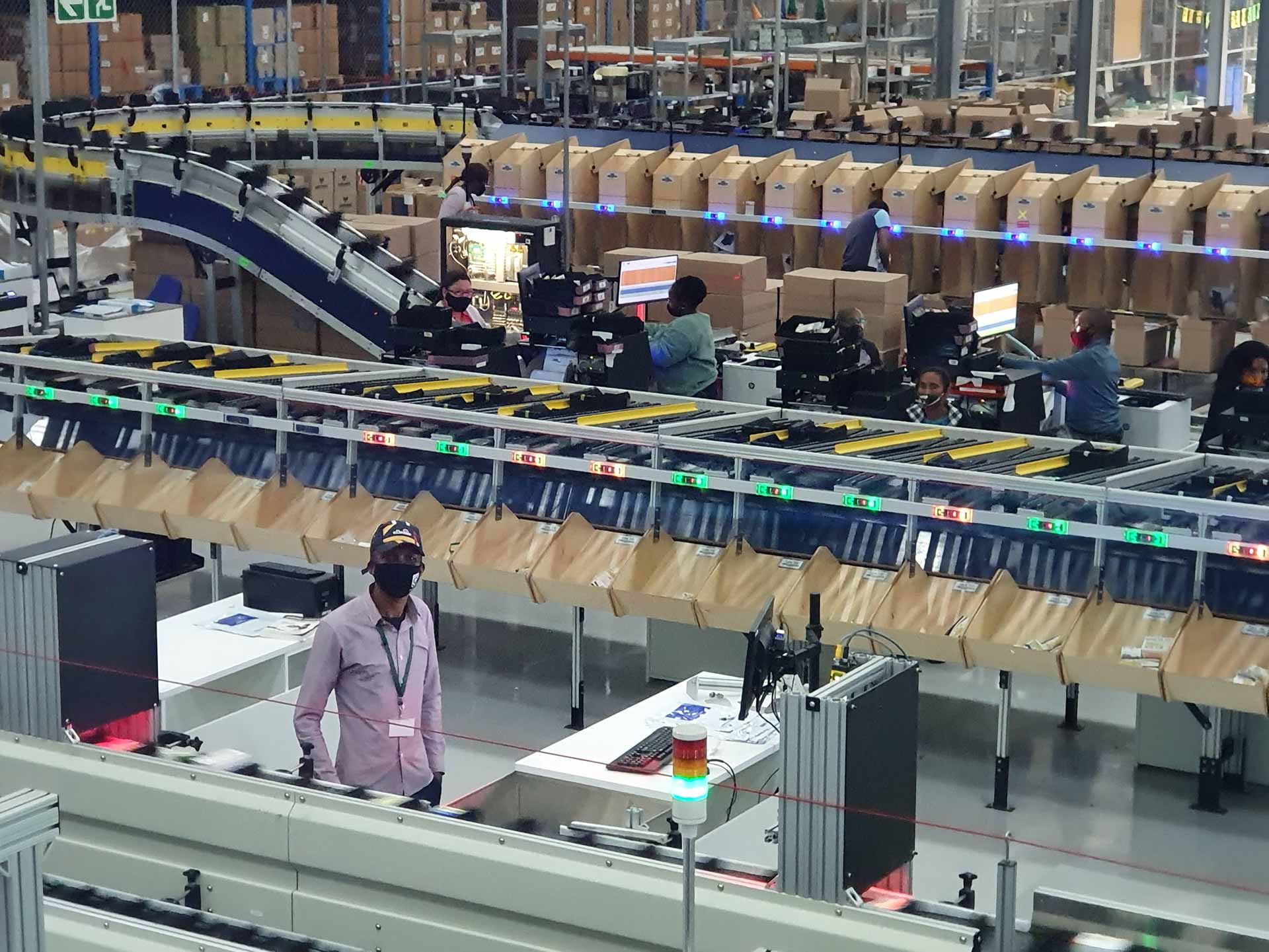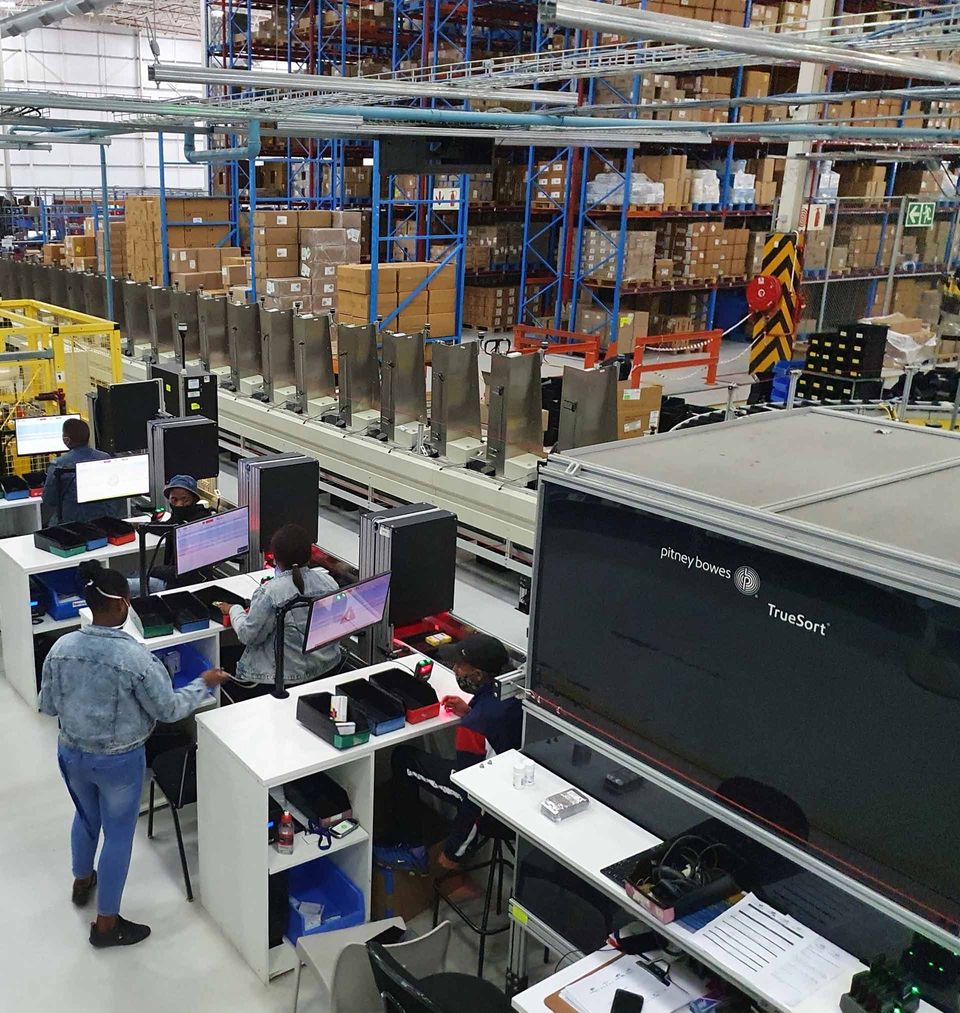Medicine parcels help patients to stay safer at home
November 20, 2020
The Chronic Dispensary Unit (CDU) is an advanced and highly specialised automated chronic medicine dispensing, sorting and parcel assembly line in Parow, Cape Town. The CDU is a contract between Western Cape Government Health (WCGH) and Medipost Pharmacy. Between the beginning of 2020 and the end of September, 3.8 million medicine parcels were dispensed from the CDU for patients with chronic health conditions.
High-tech dispensary almost doubles daily capacity to meet lockdown demand
The state-of-the-art Western Cape Government Health (WCGH) Chronic Dispensary Unit (CDU) in Parow, Cape Town, has moved into high gear this year, helping to reduce the risks of chronic patients contracting Covid-19 through preparing their medicine parcels for home delivery and collection at designated collection points at healthcare facilities during the national lockdown.
“More than 84 000 additional stable chronic patients have been registered for this service since the start of lockdown, and the CDU has ramped up its capacity to more than keep pace with this increased demand,” says Ludo Tandt, general manager of the CDU.
The CDU, a contract between WCGH and Medipost Pharmacy, was already dispensing an average of 16 500 to 18 500 parcels per day prior to the pandemic, however the daily average is now up to 32 000 parcels per day. From the start of 2020 to the end of September, 3.8 million medicine parcels were dispensed from the CDU.
Western Cape Minister of Health, Dr Nomafrench Mbombo, points out that long before the global pandemic, the WCGH was working to decongest healthcare facilities, thereby strengthening health systems while simultaneously improving the patient experience.
“For almost 15 years, the department has delivered pre-packaged patient medicine parcels for stable chronic patients to either Department facilities and clinics, or alternate collection sites to reduce waiting times and alleviate the need for patients to queue at pharmacies,” Dr Mbombo says.
The establishment of the CDU’s advanced and highly specialised automated chronic medicine dispensing, sorting and parcel assembly line in 2018 enhanced operational efficiencies, in turn creating more capacity in the Department’s hospital and clinic pharmacies for patients’ acute medication needs and in-person consultations.
“With the advent of Covid-19 there was a need to limit opportunities for this highly infectious viral illness to spread, especially among individuals with pre-existing health conditions, while still ensuring patients have access to their prescribed chronic treatment,” WCGH Head of Department, Kim Lowernherz adds.
The Department quickly established a system to ensure patients living with a stable chronic health condition could receive their medicine parcels via home delivery, with over 100 000 parcels delivered safely and conveniently to patients in their own homes since the start of lockdown.
“Through existing community-focused health structures, the medicine parcels dispensed by the CDU are disseminated through partner non-profit organisations to community health workers, who then deliver the parcels to patients.”
The CDU’s medicine dispensary system was specially designed to fulfil the specific and stringent requirements of the Western Cape Government Health for preparing and despatching large volumes of medicine parcels each month.
“These medicine parcels are a vital tool in the provision of Community Based Primary Care, bringing healthcare services closer to patients so that they are more convenient and accessible,” adds Noel Guliwe, chief executive officer of the Medipost Holdings group, which operates the CDU on behalf of WCGH.
“The CDU is therefore optimising and expanding to ensure sufficient capacity to fulfil the anticipated future demand for this successful service. Planning is at an advanced stage for a second dispensing line to be introduced by the end of the year, growing capacity for an additional 20 000 patient scripts to be processed per day.
“Chronic medicine is a vital lifeline, and this innovative use of local partnerships and world-class CDU technology has fulfilled an important role in keeping patients’ health conditions well managed during the pandemic,” Guliwe concludes.

April 11, 2025
Colorectal cancer, one of the most prevalent yet preventable cancers, can develop in the colon or rectum, often starting as small polyps that can quietly become malignant if left unchecked. Dr Mpho Ramabulana, a colorectal surgeon and gastroenterologist at Netcare Akasia Hospital, underscores the life-saving power of vigilance and the importance of early detection.

February 28, 2025
The lives of millions of South Africans with a litany of rare diseases can be vastly improved, and even saved, by addressing challenges in identifying, studying and treating their conditions. With Rare Disease Day on the 28th of February 2025, the Rare Diseases Access Initiative (RDAI) is driving an evolution of the country’s healthcare, through innovative strategies to better care for over 4.2million people living with an estimated 7000 rare diseases. “As our healthcare system faces significant changes in the years ahead, it is vital that we also advocate for people living with rare diseases in South Africa, especially those with limited healthcare access,” said Kelly du Plessis, CEO of Rare Diseases South Africa (RDSA), a member of RDAI. “As part of our ongoing research and awareness efforts, RDAI has conducted an initial analysis of the incidence and prevalence of rare diseases within the country.” This research will assist in improving access to healthcare, policy development, and patient advocacy, while giving critical insight into the challenges faced by patients. “According to research, some rare diseases affect fewer than 1 in a million people, while others, such as Down syndrome, cystic fibrosis, and haemophilia, have a more recognisable prevalence,” says Dr. Helen Malherbe, RDAI lead researcher on rare disease prevalence data. “Many conditions are undetected, underdiagnosed or misdiagnosed, with too many having no information available about them at all.” The RDAI was formed in 2019 to promote a more favourable environment for those impacted by rare diseases in South Africa. Participants include Ampath, the Board of Healthcare Funders (BHF), Discovery Health, Genetic Counsellors South Africa (SASHG), the Government Employees Medical Scheme (GEMS), Health Funders Association (HFA), Medihelp, Medscheme, North-West University (NWU), Rare Diseases South Africa (RDSA), the South African Medical Association (SAMA) and The South African Medical Technology Industry Association (SAMED). The Council for Medical Schemes (CMS) participates as an observer. In the same year, Rare Disease International signed a memorandum of understanding with the World Health Organisation leading to an international rare disease policy framework. In 2021, the United Nations General Assembly moved to adopt a resolution recognising 300 million people living with rare diseases worldwide. “A general lack of awareness and delayed diagnosis remain major hurdles for those affected by rare diseases. Policymakers and healthcare stakeholders need to prioritise access to treatment, diagnosis, and support for rare disease patients,” says Bada Pharasi, CEO of IPASA, “Through this initiative, working collaboratively with stakeholders at every level of the healthcare supply chain, we can bring real and meaningful change to those affected, including family members and care givers, through smart and efficient strategies.” The globally agreed definition of a rare disease is any medical condition with a specific pattern of clinical signs, symptoms, and findings that affects fewer than or equal to 1 in 2000 persons in a population. “Most are genetic, and some are inherited and passed down in families,” Malherbe says. “Some affect only the patient’s genetic recipe, while others may be acquired during life due to infection, trauma, or environmental effects. For many, the cause is still unknown. “These conditions mainly affect children, as they are largely incurable and many are life-threatening. Some require specialised and co-ordinated care, some have limited and expensive treatment options, while others have no information or effective treatments at all,” she adds. The RDAI is calling for a patient-centred care model built on equitable access, transparency and efficiency. Naturally, this model calls for the open participation of patients, the healthcare industry, health professionals, and the Government. “The most critical elements are robust diagnosis standards, improved access to treatment, data collection and management, co-ordination of care, measurement of outcomes and ongoing collaborative research,” du Plessis says. “We need to establish rare disease advisory committees, map gaps and opportunities, establish system requirements, create a roadmap and plan a phased implementation with clear timelines.” The RDAI states that these policy development steps would be a start in quantifying the disease burden and defining standards of care. This would be followed by building and strengthening the capacity to facilitate appropriate diagnosis, treatment, continuity and data monitoring. Thoneshan Naidoo, Chief Executive Officer of the Health Funders Association noted that, “We appreciate the unique opportunity provided by RDAI which enables stakeholders across the industry to work together and identify strategies that improve equitable access to the appropriate diagnosis, treatment and healthcare services for rare disease patients, in an affordable and sustainable manner, taking account of the other pressing needs across the healthcare system.” “True innovation in healthcare is only possible through partnerships and joint advocacy efforts that raise awareness and improve access to treatment. Our long-term goal is the development of a rare diseases policy framework and guidelines for coordinated care,” says Pharasi. “Our members are united in the commitment to unlocking improved patient outcomes and improving access to services and robust health needs assessment facilities.” he concludes. About RDAI The Rare Diseases Access Initiative (RDAI) is dedicated to advocating for improved healthcare access, policy development, and patient support for those affected by rare diseases in South Africa. The initiative brings together key healthcare stakeholders, including pharmaceutical associations, funders, genetic specialists, and patient advocacy groups, to drive impactful change. About RDSA Founded in 2013, Rare Diseases South Africa (RDSA) is a non-profit organisation advocating to ensure that people living with rare diseases and congenital disorders experience greater recognition, support, improved health service and better overall quality of life. Started out of personal need following the diagnosis of organisation founder, Kelly du Plessis' son, it became evident that there was a lack of awareness and support for rare diseases in general in South Africa. About IPASA The Innovative Pharmaceutical Association South Africa (IPASA) is a voluntary trade association representing 24 leading pharmaceutical companies committed to research, development, and innovation. Our mission is to drive healthcare advancement by advocating for policies that improve patient access to safe, high-quality, and affordable medicines.












